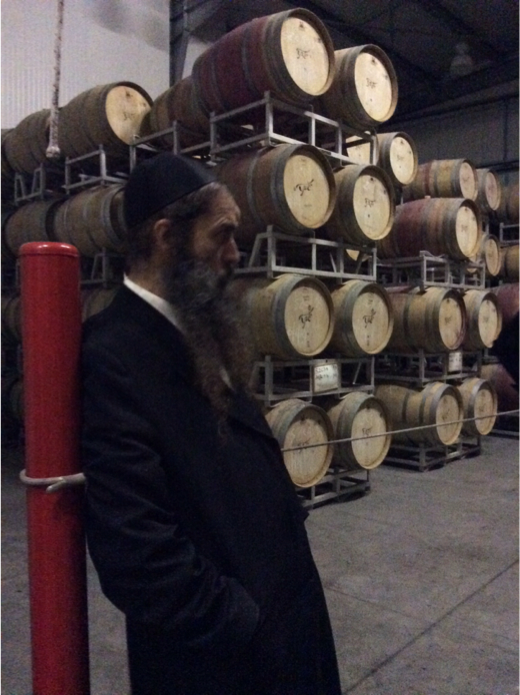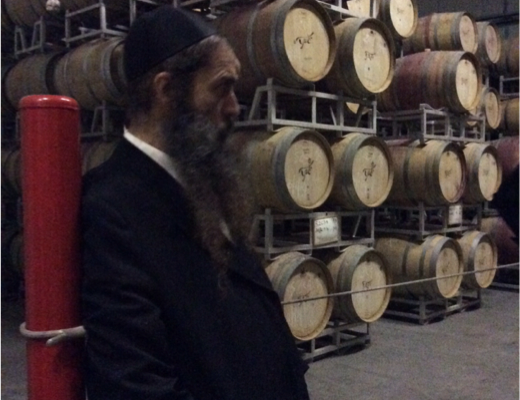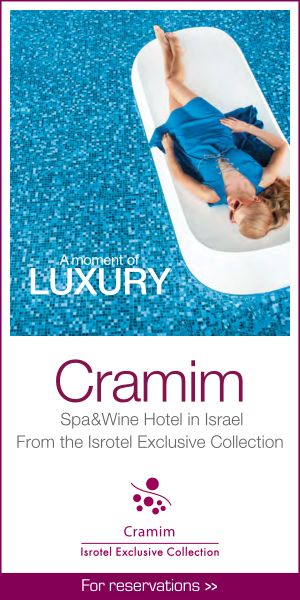“All Jewish life cycle events revolve around wine,” says Rabbi Moshe Elefant, chief operating officer of the Orthodox Union Kosher Division, the world’s largest non-profit kosher certification agency. From birth to bris (the Jewish ritual of circumcision) to marriage, wine is an essential part of Jewish religious practices. The blessing of wine is integral to Shabbat services and consumption of wine during the Passover Seder and holidays such as Purim is practically obligatory.

Earlier this week we mentioned the rules that need to be followed in order for wines to be considered kosher. The central importance of wine to Jewish religious and cultural practice is reflected in the strict rules that determine a wine’s kosher status. An important, if unusual, part of this certification is the chain of custody of a particular wine.
For a wine to be considered kosher, its production must be overseen by a specially trained rabbi and the wine must be made and handled at all times from crush to bottling to uncorking by observant Jews (kosher certification agencies differ on the “observant” status). However, the chain of custody need not be observed if a wine has gone through a process known as mevushal, from the Hebrew word for cooking or boiling.
So why does boiling a wine circumvent the need for handling by observant Jews? Since no known human pathogens can survive in wine, boiling for sanitary reasons would seem redundant. According to Rabbi Elefant, wine in ancient times was not only important for Jewish religious practices, but also important in pagan idol worship. And there are strict prohibitions in Jewish law against consuming wine that has been used for idolatrous purposes. Therefore, the best way to ensure its provenance was to boil it.
“Boiled wine was considered to be of inferior quality, so it was assumed that idolaters would not use it for their idols,” says Rabbi Elefant. In essence, for practical purposes, mevushal originated as a technique designed to reduce wine quality.
What does the mevushal process do to a wine?
At first, the concept of heating a wine to near boiling, even for a short time, might horrify a real oenophile. For some reason, wine is often perceived as a sensitive, fragile creature.
Depending on the heat and duration, high temperatures can certainly effect chemical and physical changes to wine. For example, the vinification of wines like Madeira involves heating of the juice and wine and contributes to its unique aroma profile. Some volatile aroma compounds will inevitably be lost in the heating process during cooking. A compound known as hydroxymethylfurfural (HMF), a good indicator of the heating process, and other related compounds can have a “toasty” aroma. HMF and friends are often found in beer, which, incidentally, is typically boiled for at least an hour before fermentation. The presence of furfurals could explain the curious descriptor of “malt” that I happened to notice in a cheap mevushal Chardonnay I had a few years back.
Modern practices can now mitigate the effect of boiling on the aroma and flavor characteristics of wine. Although technically the wine should reach “boiling” temperatures (roughly 212°F), a temperatures from 165-190°F are sufficient for most certification agencies. Techniques such as flash pasteurization, where heat exchangers provide rapid heating and cooling, can reduce the amount of time that wine is heated and thereby reduce some of the effects of cooking on quality.
A search of the scientific literature reveals several studies where treatment of wine at high temperatures for short periods of time does not statistically significantly change its flavor profile. For example, a recent work involving flash pasteurization in wines concludes that
“The process of heating juice or wine is generally negatively perceived by practitioners concerned about the possible impact of heat on the sensory profile of wines. However, results from this study and from the literature indicate that this negative perception is not supported by scientific data.”
This result has actually been known for a while in the wine science community, with one study dating back to 1994 concluding similarly: “Heat treatments of juices and wines at 90°C [for a few minutes] produced wines which were not generally significantly different from their respective controls.”
An interesting alternative to flash pasteurization is thermovinification, or heating of grapes of juice before fermentation. Thermovinification has been shown to decrease methoxypyrazine levels (green aromas) and increase the amount of phenolic and antioxidant compounds in red wines (the heat helps break down skins, leading to release of more of the skin phenolics). Thermovinification is used in Beaujolais, and even by some very high-profile wineries such as Châteauneuf-du-Pape’s Château Beaucastel. Interestingly, thermovinification eliminates concerns about handling of wines by observant Jews during winemaking since the product becomes mevushal after the heating process. According to Rabbi Elefant, “This is a perfect meeting of Kosher law and technology.”
So while the Ancient Hebrews boiled their wine with intent to reduce its quality (and its appeal to idolaters), mevushal wines made using modern techniques can be largely indistinguishable from non-cooked wines. Kosher certification agencies are fine with this fact. As long as the heating process is accomplished according to the prescribed rules, it’s kosher. Quoting Rabbi Elefant, “If you tell me [mevushal wine] is just as good, or even better, that doesn’t matter to me. The law is the law is the law.”
A statement from Cramim Spa and Wine Hotel, our Kosher Wine Week Sponsor
Cramim Spa and Wine Hotel is situated in the heart of the Judean wine region, a 15 minute drive from Jerusalem. The hotel is surrounded by a beautifully scenic, pastoral setting and offers a quality experience of combined leisure, recreation, fine wines and impeccable tastes. Hotel guests will enjoy an exquisite chef restaurant, boutique wine bar, a contemporary spa complex with unique vino-therapy treatments, as well as pampering rooms and suites that boast a modern interior design.


